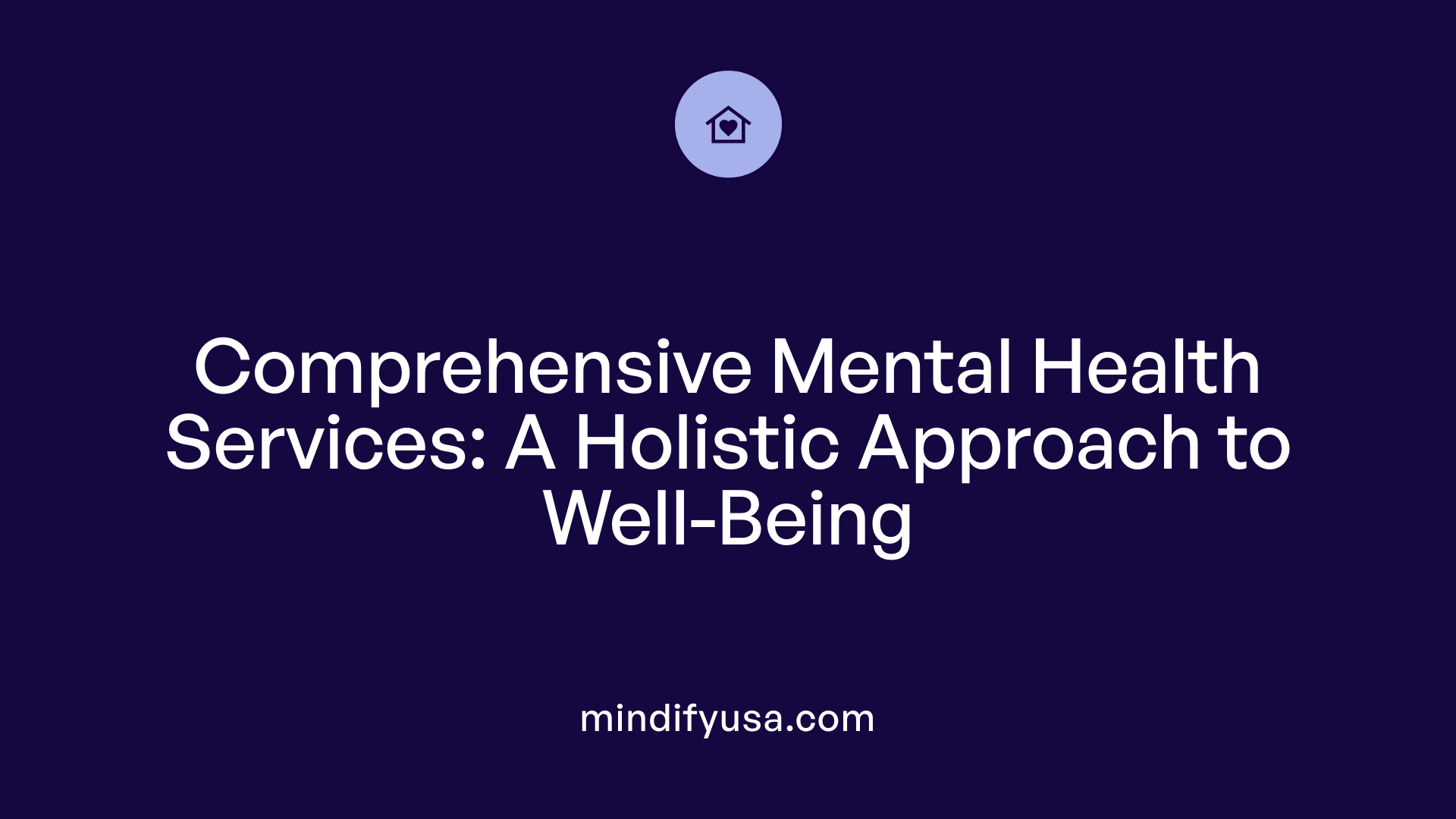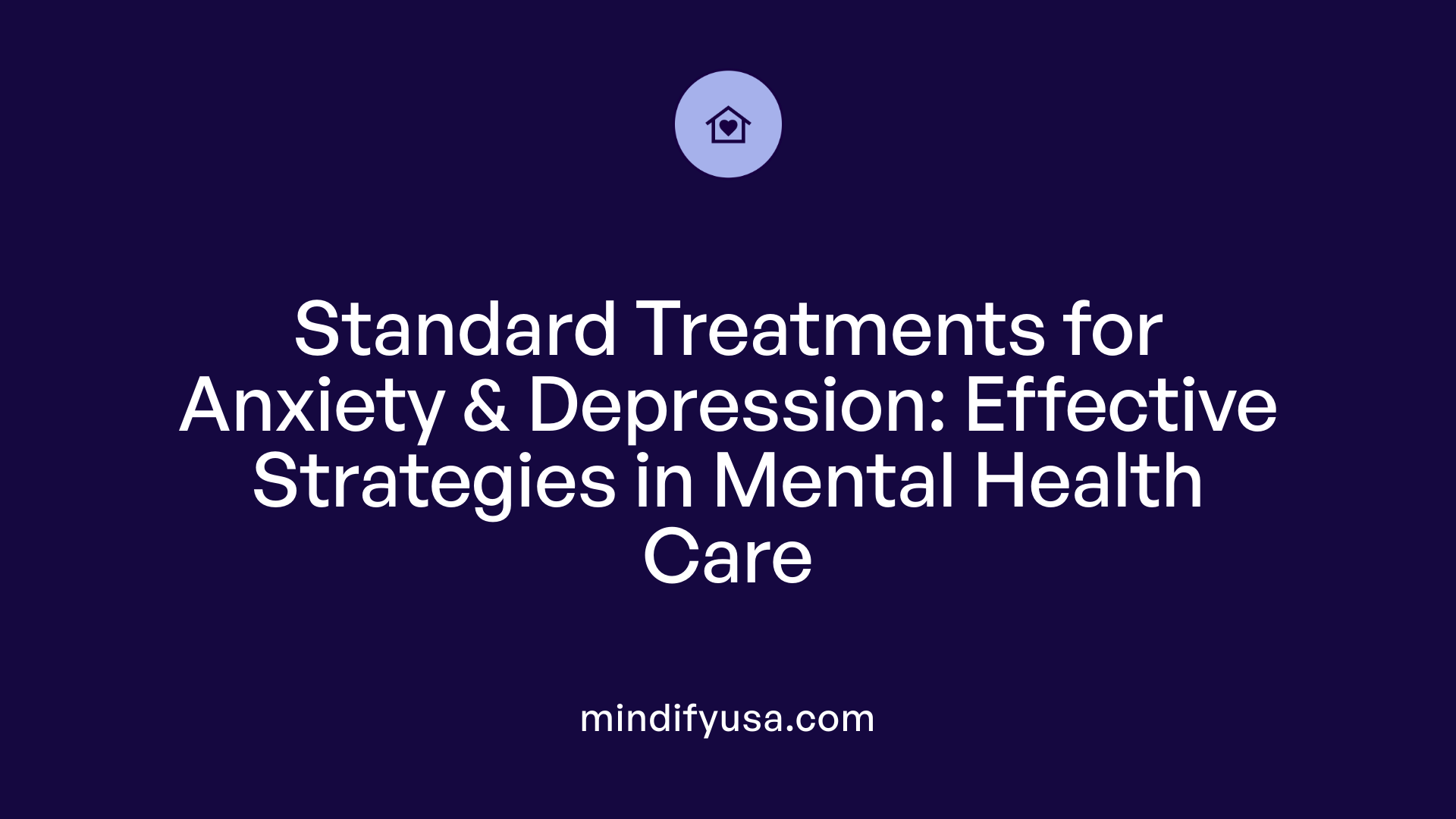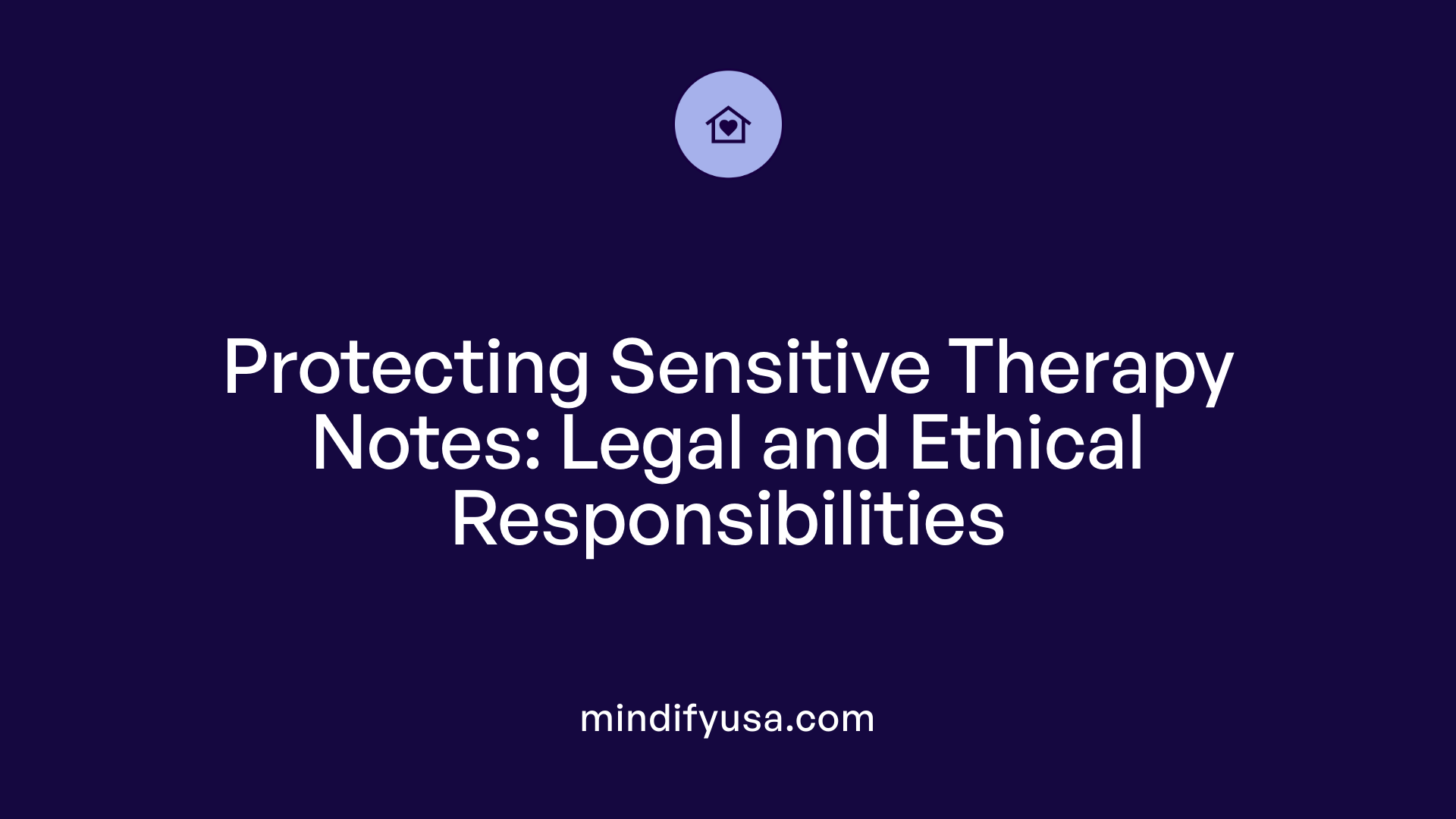The Complexities of Mental Health Information Sharing
Mental health treatment for children and adolescents often involves coordination between health providers and schools. However, the confidentiality of therapy notes remains a sensitive and legally complex issue. This article explores whether therapy notes are shared with schools, examining relevant laws, patient rights, and clinical practices to clarify these often misunderstood boundaries.
What Are Comprehensive Mental Health Services?

What are comprehensive mental health services?
Comprehensive mental health services involve a holistic approach that addresses the interconnected aspects of an individual's mind, body, and spirit. This means that treatment extends beyond just managing symptoms to encompass all elements of a person's well-being.
Definition and scope of comprehensive mental health services
These services include a broad scope: therapy, medication management, counseling, crisis intervention, and ongoing support tailored to unique individual needs. The approach recognizes that mental health deeply intertwines with physical health and life circumstances.
Holistic approach to mental well-being
A holistic view is essential for effective care. It looks at emotional, psychological, and social factors simultaneously. Mental health is not isolated but related to lifestyle, support systems, and overall life satisfaction.
Integration of therapy, medication, crisis intervention, and support
Comprehensive care integrates multiple treatment methods. Therapy and medication are combined when necessary, while crisis intervention provides emergency support. Alongside, continual support and coordination with primary care and specialists ensure treatment plans are responsive and adaptive.
This interconnected approach improves outcomes by addressing the whole self rather than isolated symptoms, promoting lasting wellness and recovery.
Standard Treatments for Anxiety and Depression in Mental Health Care

What treatments are typically included for anxiety and depression within mental health services?
Treatments for anxiety and depression generally involve a combination of therapeutic approaches tailored to the individual's needs. Psychotherapy is a cornerstone of treatment, with Cognitive-Behavioral Therapy (CBT) and Interpersonal Therapy (IPT) being the most widely used. CBT focuses on identifying and changing negative thought patterns and behaviors, while IPT addresses interpersonal issues that may contribute to emotional distress. Behavioral activation is another technique used to encourage engagement in meaningful activities.
Medication management plays a significant role, especially for moderate to severe cases. Antidepressants such as Selective Serotonin Reuptake Inhibitors (SSRIs) and Serotonin-Norepinephrine Reuptake Inhibitors (SNRIs) are commonly prescribed. These medications help balance brain chemicals linked to mood regulation. Often, medications are combined with psychotherapy to achieve better long-term outcomes.
For mild symptoms, self-help strategies and lifestyle changes can be effective. These include increased physical activity, improved sleep habits, stress management, and participation in support groups. Such approaches may prevent symptom progression and support overall well-being.
In more serious cases, a combined approach using both therapy and pharmacotherapy is recommended. Regular monitoring by healthcare providers helps ensure that treatment is effective and side effects are managed. For individuals who do not respond to standard treatments, specialized interventions like brain stimulation therapies or medication adjustments may be considered. Additionally, screening for substance use disorders is important to provide comprehensive care that addresses all contributing factors.
HIPAA and the Protection of Psychotherapy Notes
What are the basics of the HIPAA Privacy Rule?
The HIPAA Privacy Rule establishes standards for protecting sensitive patient health information, including mental health records. It balances privacy protections with the need for information sharing among providers for treatment and safety. Under HIPAA, providers may disclose protected health information (PHI) for treatment, case management, or safety concerns without patient consent, unless federal or state laws impose stricter rules.
How are psychotherapy notes specially protected under HIPAA?
Psychotherapy notes are uniquely defined as records created by mental health professionals during private counseling sessions, separate from the individual's regular medical record. These notes are given heightened confidentiality and generally require explicit patient authorization for disclosure. Unlike most other medical information, psychotherapy notes are not typically accessible to patients or personal representatives.
Under what conditions may psychotherapy notes be disclosed?
Disclosure of psychotherapy notes usually requires patient authorization, but exceptions exist. Notes may be shared without permission in limited mandated situations, such as reports of abuse or a serious threat of harm to the patient or others. Even then, providers exercise professional judgment and comply with relevant legal and ethical standards to ensure patient safety.
How do psychotherapy notes differ from other medical records?
While general mental health records can often be shared with family members or other providers for treatment purposes—sometimes even without patient consent—psychotherapy notes remain more restricted. They are maintained separately from the medical record and not included in routine health information exchanges. This special status reflects their sensitive nature and the vital importance of maintaining patient trust and therapeutic alliance.
Providers must also be aware that state laws can impose additional protections or requirements for handling psychotherapy notes, sometimes granting patients greater access rights than federal HIPAA rules. This legal complexity underscores the importance for clinicians to stay informed of both federal and state regulations when managing psychotherapy documentation.
Federal and State Legal Frameworks Governing Mental Health Record Confidentiality
What Federal Laws Govern Mental Health and Substance Use Record Confidentiality?
Federal regulations primarily include the Health Insurance Portability and Accountability Act (HIPAA) Privacy Rule and the confidentiality statute for substance abuse treatment records (42 U.S.C. § 290dd-2). HIPAA balances protecting the privacy of mental health information with necessary information sharing for treatment and safety. It allows disclosure of protected health information (PHI) to other providers for treatment without patient consent, except for psychotherapy notes, which require separate authorization. Substance abuse records generally require patient consent for disclosure, except in emergencies or disclosures within controlled programs.
How Do State Laws Vary and Affect Information Sharing?
State laws governing mental health and substance use records differ widely. Some states permit broader sharing of mental health information without explicit consent in emergencies or for treatment purposes, while others impose stricter controls requiring explicit consent. Similarly, substance abuse treatment record laws vary, with some states allowing sharing beyond federal allowances and others enforcing tighter restrictions. For example, Illinois law affords minors over 12 significant control over their mental health records, including consent rights, emphasizing confidentiality.
What Is the Interaction Between Federal and State Laws?
Federal laws generally defer to stricter state laws if those provide greater privacy protections. This means the legal landscape for mental health record confidentiality is often shaped by state regulations. Providers must navigate this interplay carefully, ensuring compliance with the highest standard between federal and state mandates. This interaction affects disclosures to family, law enforcement, and other parties, particularly in emergencies or safety threats.
What Protections Exist Specifically for Minors?
Minors’ mental health information is subject to additional protections. Parents typically have access to their child's mental health records except psychotherapy notes, but state laws like those in Illinois may require minors’ consent for access or disclosure in many cases. Courts have affirmed these protections, especially limiting access during family proceedings and ensuring schools distinguish mental health records from academic records to maintain confidentiality. These protections support minors' rights to privacy and trust in seeking mental health services.
| Aspect | Federal Law Highlight | State Law Impact | Notes |
|---|---|---|---|
| Mental Health Information | HIPAA Privacy Rule protects PHI with exceptions for treatment and safety | Variable: some states stricter than federal law | State law prevails if more protective |
| Psychotherapy Notes | Require separate authorization for disclosure | Some states provide greater patient access | Notes excluded from general medical record |
| Substance Abuse Treatment Data | 42 U.S.C. § 290dd-2 restricts disclosure without consent except emergencies | States vary in scope, sometimes stricter or broader | State law controls record privacy |
| Minor Patient Records | Parents’ access typically allowed, excluding psychotherapy notes | Minor consent requirements and controls vary widely | Illinois example: minors >12 control records |
Understanding these legal frameworks is essential for mental health providers to protect patient confidentiality while facilitating appropriate care and safety measures.
Access to Therapy Notes: Patient, Minor, and Parental Rights

General Lack of Patient Access to Psychotherapy Notes
Psychotherapy notes, distinct from the broader medical record, are typically reserved for use by the treating mental health professional. Under HIPAA, patients ordinarily do not have access to these notes, as they are considered confidential and are protected for privacy and clinical integrity. Disclosures require specific patient authorization except in rare mandated circumstances, preserving the therapeutic space and professional judgment.
Parental Access to Minor’s Mental Health Information Excluding Psychotherapy Notes
Parents generally have access to their minor child's mental health information contained within the medical record; however, psychotherapy notes remain protected and are usually excluded. This distinction recognizes the sensitive nature of these notes. While parents serve as personal representatives under HIPAA, this status does not typically grant them access to psychotherapy notes, supporting a balance between parental involvement and minor confidentiality.
State-Specific Consent Rules for Minors, Including Illinois
Consent and access laws for minors' mental health records vary by state, introducing complexity into confidentiality practices. For example, Illinois law grants minors over 12 years significant control over their mental health records, requiring their consent for release. The Illinois Mental Health and Developmental Disabilities Confidentiality Act ensures minors' records are protected and restricts disclosure without consent, even during family court proceedings. This state-specific approach underscores the importance of personalized safeguards aligned with local legal frameworks.
Implications for Adolescent Privacy and Treatment Engagement
These confidentiality protections encourage adolescent comfort and trust in treatment by safeguarding their privacy rights. Limiting parental access to psychotherapy notes may foster more open communication between minor patients and clinicians, enhancing treatment engagement. By respecting adolescents’ confidentiality, mental health professionals contribute to a therapeutic environment conducive to honest dialogue and effective care.
| Aspect | Details | Legal/Clinical Implications |
|---|---|---|
| Patient Access | Typically denied for psychotherapy notes | Protects patient privacy and clinical integrity |
| Parental Access for Minors | Allowed for most mental health records, excluding notes | Balances parental involvement with minor confidentiality |
| State Laws (Illinois Example) | Minors over 12 must consent to record release | Provides greater minor autonomy and privacy protections |
| Treatment Engagement | Enhanced by confidentiality and trust | Supports therapeutic alliance and adolescent openness |
Are Therapy Notes Shared With Schools?
Distinction Between Academic Records and Mental Health Therapy Notes
Academic records and mental health therapy notes are legally distinct. While academic records document educational progress and achievements, therapy notes pertain specifically to an individual's mental health treatment. Therapy notes are considered highly confidential and are separated from the general medical record.
Legal Protections for Minors’ Mental Health Records in School Contexts
Minors' mental health records enjoy strong legal safeguards. For instance, Illinois law under the Mental Health and Developmental Disabilities Confidentiality Act explicitly protects minors' therapy records, requiring consent for their release. This means that even in school settings, minors’ therapeutic information cannot be disclosed without permission.
Recent Illinois Court Rulings Affirming Confidentiality
A recent appellate ruling in Illinois reinforced the privacy of minors’ mental health records, particularly in family court and school contexts. The court clarified that therapy notes cannot be disclosed without proper consent, distinguishing these from educational records and underscoring their privileged status under confidentiality laws.
Schools' Obligation to Comply With Confidentiality Laws
Schools providing therapeutic services must maintain stringent record-keeping practices that respect these legal protections. They are obligated to separate mental health therapy notes from academic files and ensure that confidentiality laws are fully upheld, preventing unauthorized access or sharing.
Potential Risks of Inadvertent Disclosure
Improper handling or misunderstanding of these laws poses risks of inadvertent disclosure of sensitive therapy information. Such breaches can undermine trust, impair treatment engagement, and violate the minor's right to confidentiality and comfort in therapy.
Understanding this legal landscape helps mental health professionals and schools support minors' privacy rights effectively, fostering an environment that promotes therapeutic trust and compliance with statutory obligations.
The Role of Mental Health Clinicians in Safeguarding Therapy Notes

Navigating Legal, Ethical, and Administrative Requirements
Mental health clinicians must carefully manage psychotherapy notes, which are afforded special protections under laws like HIPAA and state regulations. These notes, kept separate from the main medical record, require particular attention to confidentiality because their disclosure typically needs explicit patient authorization unless mandated by law.
Balancing Patient Confidentiality with Treatment Coordination
While protecting patient privacy remains paramount, clinicians also face the challenge of sharing relevant information to ensure quality care. HIPAA allows for discretionary disclosure of protected health information, including psychotherapy notes, to individuals involved in a patient's care when the patient consents or when there is a serious and imminent threat to safety. Providers must weigh these factors judiciously to maintain trust while facilitating treatment coordination.
The Importance of Clinician Awareness of Applicable Laws
Legal requirements surrounding psychotherapy notes can vary significantly between federal and state jurisdictions. Clinicians should stay informed about both HIPAA regulations and stricter state laws that may impose additional restrictions or grant greater patient access. Being knowledgeable ensures appropriate handling of sensitive records and protects both patient rights and clinician liability.
Discretionary Nature of Disclosures Under HIPAA
HIPAA grants providers the discretion—not obligation—to disclose psychotherapy notes. This flexibility requires clinicians to exercise professional judgment grounded in ethical standards and patient welfare. Thoughtful consideration of when and to whom disclosures occur is essential for safeguarding the therapeutic relationship and complying with legal mandates.
Benefits and Challenges of Patient Access to Therapy Notes Through Open Notes Initiatives

Patient empowerment and autonomy
Open notes initiatives allow patients to access their psychotherapy notes online, fostering greater autonomy in managing their mental health. This transparency helps individuals feel more in control of their treatment journey, encouraging active participation and decision-making in their care.
Improved understanding of treatment and trust in clinicians
Access to therapy notes can enhance patients' comprehension of therapeutic processes and personal goals. Reading detailed notes increases insight and aids memory recall of session content, which can strengthen the therapeutic alliance. When notes are composed clearly and respectfully, patients often report higher levels of trust and engagement with clinicians.
Impact on managing anxiety and depression
For those dealing with anxiety and depression, open notes offer tangible records of their treatment progress. Patients frequently feel better equipped to manage symptoms, as they can revisit therapeutic strategies and understand their development over time. Surveys indicate most patients experience increased understanding and trust, which supports improved mental health outcomes.
Potential drawbacks and how they are addressed
While most reactions to open notes are positive, a minority of patients report confusion or distress upon reading notes. Providers address these challenges by writing notes in a supportive tone and discussing any concerns during sessions. This approach minimizes negative impacts and ensures that open notes enhance, rather than hinder, patient care.
Crisis Situations and Disclosure of Mental Health Information
What legal provisions allow disclosure of mental health information in emergencies?
Under HIPAA and related federal laws, providers can disclose protected health information (PHI) without patient consent in emergency situations. This includes cases of serious and imminent threats, such as a suicide risk or drug overdose. Disclosure is permitted when necessary to prevent harm or when the patient is incapacitated and unable to provide consent.
How is information shared to prevent serious harm?
Healthcare providers have the discretion to share mental health information with family members, law enforcement, or others involved in care if there is a genuine threat to safety. This protected sharing is grounded in professional judgment ensuring the information is used appropriately to mitigate risk.
What are some examples of emergency disclosures?
Examples include communicating with family or authorities when a patient is at risk of self-harm or harm to others, or when responding to situations like opioid overdoses where immediate intervention is critical. Providers may share relevant PHI to facilitate timely and effective crisis response.
When can disclosures be made to family and law enforcement?
Disclosures are allowed when patients are present and capable of consenting or, if incapacitated, based on clinical judgment aligned with the patient’s best interests. Providers must balance privacy with safety considerations, often notifying family or law enforcement only in cases of serious and imminent risk.
In all cases, disclosures during crises adhere to both federal and state laws, which may impose stricter privacy protections. Understanding these regulations helps providers safeguard patients while addressing urgent mental health emergencies.
Balancing Confidentiality and Care in Mental Health Records Sharing
Confidentiality of therapy notes is a cornerstone of effective mental health treatment, especially for minors navigating sensitive issues. Federal and state laws form a complex framework that mostly prohibits sharing psychotherapy notes with schools without explicit consent, underscoring the importance of protecting patient privacy and therapeutic trust. Mental health professionals, schools, and families must maintain clear boundaries respecting legal regulations while supporting comprehensive care coordination. Awareness and adherence to these rules ensure that mental health services remain respectful, effective, and conducive to healing, without compromising the confidentiality essential to treatment success.
References
- Home | SAMHSA - Substance Abuse and Mental Health ...
- HIPAA Privacy Rule and Sharing Information Related to ...
- Constraints on Sharing Mental Health and Substance-Use ...
- Access to Psychotherapy Notes: Review of Legal ...
- 2094-Does a parent have a right to receive a copy of ...
- Sharing Clinical Notes in Psychotherapy: A New Tool to ...
- Appellate Court Clarifies Minor's Right to Confidentiality
- Comprehensive Mental Health Care: Treating Your “Whole ...
- Mental Health Conditions: Depression and Anxiety





































































































